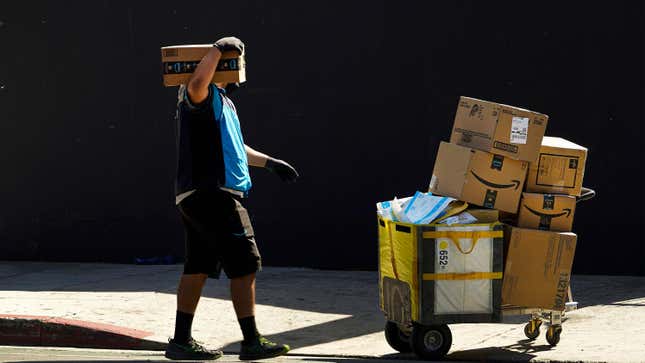
The coronavirus pandemic in the U.S. must be over because otherwise, Amazon’s decision to end free testing for warehouse workers might seem rather reckless.
According to the Information, the e-commerce giant told workers in a message through an internal company app that coronavirus testing at its logistics centers will be discontinued on July 30—despite continued low rates of vaccination in some of the states where it operates. For example, Mayo Clinic data shows Arkansas, Alabama, and Mississippi all have vaccination rates below 40%. In a wide range of other states, vaccine uptake is low enough that it would be hard to argue the risk of an unvaccinated individual contracting the virus is low at all.
Amazon’s excuse to employees, the Information wrote, is that safety measures implemented so far have already put the company back on a “path to normal” and that access to coronavirus tests is now widespread.
“Free COVID-19 testing is now widely available and our employees have many options available to them, including through health providers and public testing sites,” the company wrote in the note to employees. At least one warehouse worker in Minnesota told the Information that safety protocols at their job site, such as temperature checks before entering the facility, are no longer routinely observed, although employees who have not received a vaccine are still required to wear masks.
According to the Johns Hopkins University School of Medicine tracker, confirmed cases of the virus across the U.S. are once again increasing. The Delta variant of the coronavirus, which research has indicated may be up to 225% as infectious as the original virus that started the worldwide pandemic, is now the dominant strain across the country. Health authorities in some regions of the country are considering re-implementing mask mandates, according to the Washington Post. While studies have currently found existing vaccines are effective against the Delta variant, those who have been unable to get a vaccine, have a rare medical condition preventing them from doing so, or who simply refuse to get a shot are at high risk. The pandemic may stretch on for quite a long time, even if potential future waves don’t come with the same degree of hospitalization or death seen in earlier ones.
“Most people will either get vaccinated, or have been previously infected, or they will get this Delta variant,” former Food and Drug Administration Commissioner Dr. Scott Gottlieb told CBS earlier this month. “And for most people who get this Delta variant, it’s going to be the most serious virus that they get in their lifetime in terms of the risk of putting them in the hospital.”
Centers for Disease Control and Prevention Director Dr. Rochelle Walensky told reporters on Friday that infections across the U.S. were up 70% in just a week, with deaths climbing by 36%.
“This is becoming a pandemic of the unvaccinated,” Dr. Walensky said. “If you remain unvaccinated, you are at risk.”
During the pandemic, workers at some Amazon warehouses staged walkouts in protest of insufficient precautions in place to safeguard them against coronavirus outbreaks, and numerous warehouses were hit by cases.
At the peak of its testing program, the Information reported, Amazon said approximately 50,000 workers a day were receiving tests. An Amazon spokesperson said the company will consider re-implementing coronavirus tests if federal, state, or local health authorities advise them to do so, according to The Verge.
Some other companies are moving in the opposite direction, becoming more cautious about their plans to return to normal operations amid the pandemic. For example, Apple is reportedly delaying its return-to-office date by at least a month (no earlier than October). Facebook and Google have both made returning to the office for the foreseeable future optional.